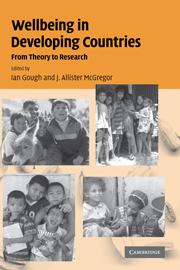Book contents
- Frontmatter
- Contents
- Figures
- Tables
- Notes on contributors
- Acronyms
- Preface
- Introduction
- 1 Theorising wellbeing in international development
- Part I Human needs and human wellbeing
- Part II Resources, agency and meaning
- Part III Quality of life and subjective wellbeing
- 10 Cross-cultural quality of life assessment approaches and experiences from the health care field
- 11 Researching quality of life in a developing country: lessons from the South African case
- 12 The complexity of wellbeing: a life-satisfaction conception and a domains-of-life approach
- Conclusion: researching wellbeing
- References
- Index
10 - Cross-cultural quality of life assessment approaches and experiences from the health care field
Published online by Cambridge University Press: 22 September 2009
- Frontmatter
- Contents
- Figures
- Tables
- Notes on contributors
- Acronyms
- Preface
- Introduction
- 1 Theorising wellbeing in international development
- Part I Human needs and human wellbeing
- Part II Resources, agency and meaning
- Part III Quality of life and subjective wellbeing
- 10 Cross-cultural quality of life assessment approaches and experiences from the health care field
- 11 Researching quality of life in a developing country: lessons from the South African case
- 12 The complexity of wellbeing: a life-satisfaction conception and a domains-of-life approach
- Conclusion: researching wellbeing
- References
- Index
Summary
Introduction
As a result of increased international attention to the topic of Quality of Life (QoL), there has been an increase in demand for cross-culturally applicable measures of it. However, there are conceptual, methodological and practical problems in assessing quality of life across cultures. For example, the quality of life construct or modes of assessment may not be transferable from one cultural context to another, and there may be practical difficulties with the application of quality of life measures in developing countries.
Quality of Life is a concept with a complex and multiple history that incorporates perspectives from psychology, politics, economics, and philosophy. QoL was established as an area of study in sociology and social policy from the second half of the last century by researchers like Andrews and Withey, Campbell, and Flanagan who formed part of the Social Indicators movement (now represented by the international network ISQOLS). A couple of decades later QoL was adopted by health scientists and psychologists and defined in terms of people's perception of their health status, effectively becoming Health-Related QoL (now represented by the separate international network ISOQOL). Although there has been little communication between these research traditions and their membership organisations, this may be starting to change with the advent of multi-disciplinary projects such as the Wellbeing in Developing Countries ESRC Research Group (WeD).
- Type
- Chapter
- Information
- Wellbeing in Developing CountriesFrom Theory to Research, pp. 219 - 241Publisher: Cambridge University PressPrint publication year: 2007
- 13
- Cited by

